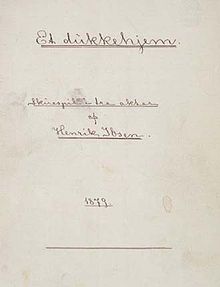Nora Helmer
| A Doll's House | |
|---|---|

Original manuscript cover page, 1879
|
|
| Written by | Henrik Ibsen |
| Characters |
|
| Date premiered | 21 December 1879 |
| Place premiered |
Royal Theatre in Copenhagen, Denmark |
| Original language | Danish |
| Subject | The awakening of a middle-class wife and mother. |
| Genre |
Naturalistic / realistic problem play Modern tragedy |
| Setting | The home of the Helmer family in an unspecified Norwegian town or city, circa 1879. |
A Doll's House (Bokmål: Et dukkehjem; also translated as A Doll House) is a three-act play written by Henrik Ibsen. It premiered at the Royal Theatre in Copenhagen, Denmark, on 21 December 1879, having been published earlier that month. The play is set in a Norwegian town circa 1879.
The play is significant for the way it deals with the fate of a married woman, who at the time in Norway lacked reasonable opportunities for self-fulfillment in a male dominated world. It aroused a great sensation at the time, and caused a “storm of outraged controversy” that went beyond the theatre to the world newspapers and society.
In 2006, the centennial of Ibsen's death, A Doll's House held the distinction of being the world's most performed play for that year.UNESCO has inscribed Ibsen's autographed manuscripts of A Doll's House on the Memory of the World Register in 2001, in recognition of their historical value.
The title of the play is most commonly translated as A Doll's House, though some scholars use A Doll House. John Simon says that A Doll’s House is "the British term for what we call a 'dollhouse'".Egil Törnqvist says of the alternative title: "Rather than being superior to the traditional rendering, it simply sounds more idiomatic to Americans."
The play opens at Christmas time as Nora Helmer enters her home carrying a number of packages. Nora's husband Torvald is working in his study when she arrives. He playfully rebukes her for spending so much money on Christmas gifts, calling her his "little squirrel". He teases her about how she spent weeks making gifts and ornaments by hand last year because money was scarce. This year Torvald is due a promotion at the bank where he works, so Nora feels that they can let themselves go a little. The maid announces two visitors: Mrs. Kristine Linde, an old friend of Nora's, who has come seeking employment, and Dr. Rank, a close friend of the family, who is let into the study. Kristine has had a difficult few years, ever since her husband died leaving her with no money or children. Nora explains that things have not been easy for them either: Torvald became sick and they had to travel to Italy so he could recover. Kristine further explains that when her mother was ill, she had to take care of her brothers, but now that they are grown she feels her life is "unspeakably empty". Nora promises to talk to Torvald about finding her a job. Kristine gently tells Nora that she is like a child. Nora is offended, so she reveals that she borrowed money from "some admirer", so they could travel to Italy to improve Torvald's health. She told Torvald that her father gave her the money, but in fact she managed to illegally borrow it without his knowledge. Over the years, she has been secretly working and saving up to pay it off.
...
Wikipedia
